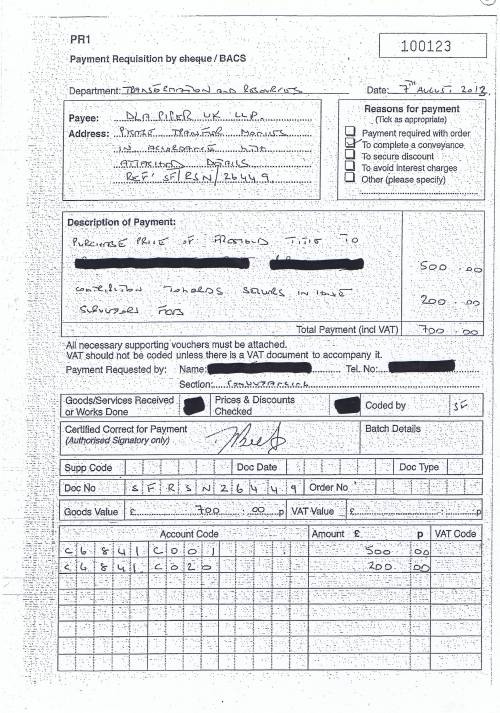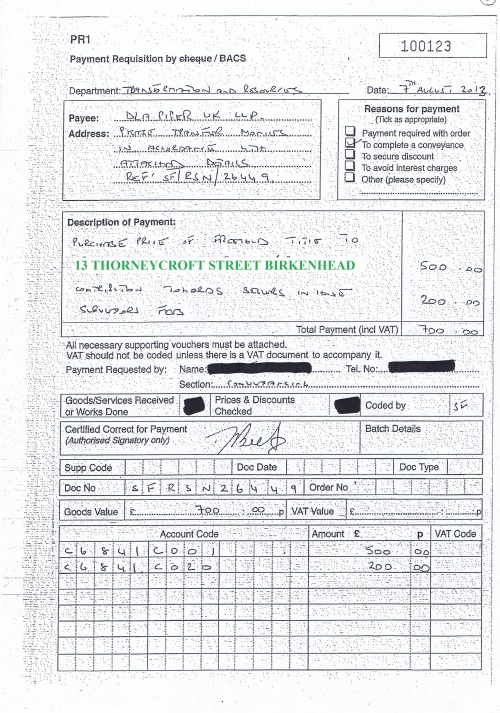Wirral Council U-turn on refusal of request for information after complaint to the Information Commissioner’s Office
Last year, during the 2013/14 audit I requested various information on various payments Wirral Council has made to legal firms. One of these was an invoice for £700 for conveyancing done by DLA Piper UK LLP (a copy of which is below).

As you can see above it’s for a BACS payment (although the payments over £500 list this as a CHAPS payment) for £700, split into £200 for a contribution towards sewers (although the rest of what the £200 is for can’t be made out due to bad handwriting) and £500 to do with the purchase of the freehold title.
If you look at the image above you’ll find the address of the property is blacked out. Section 15 of the Audit Commission Act 1998 allow Wirral Council to redact information if it relates to a member of their staff (or payments or other benefits made to their staff connected with their employment) or to withhold personal information if the external auditor agrees to it.
However their auditor has confirmed that there were no such requests. Wirral Council also rely on the decision in Veolia ES Nottinghamshire Ltd v Nottinghamshire County Council & Ors [2010] EWCA Civ 1214 in blacking out information that falls into the meaning of “commercial confidentiality”.
So going back to the PR1 form above I wanted to know what the address that this £700 for conveyancing spent by Wirral Council was, so back on the 26th January 2015 I asked using the Freedom of Information Act for the address.
By the 24th February 2015, having received no reply to my request of the 26th January 2015 within the 20 days Wirral Council have to respond to FOI requests, I requested an internal review because of the lack of response.
On the 23rd March 2015, a Rosemary Lyon who is a solicitor working at Wirral Council replied to my request for an internal review. She regarded the request as one that fell within the Environmental Information Regulations 2004, so considered it as a representation under regulation 11.
She then went on to refuse the request using an exception in Regulation 12(5)(e) which states:
The reasons she gave for refusing the request were:
- The information is commercial or industrial in nature
- Confidentiality is provided by law
- The confidentiality is protecting a legitimate economic interest
- The confidentiality would be adversely affected by disclosure.
I consider that the information relates to the commercial activity of a third party. I also consider that confidentiality is provided by law in that it is imposed on the Council as a public authority by the common law of confidence and contractual obligation. I consider that the confidentiality is protecting a legitimate economic interest. The First Tier Tribunal (Information Rights) confirmed in Elmbridge Borough Council v. Information Commissioner and Gladedale Group Ltd (EA/2010/0106, 4 January 2011) that to satisfy this element of the test, disclosure of the confidential information would have to adversely affect a legitimate economic interest of the person the confidentiality is designed to protect. I consider that disclosure of the requested information would adversely affect the legitimate economic interest of the third party and also that of the Council.
This exception is subject to the public interest test.
Public interest factors in favour of disclosure
- Promotion of transparency and accountability of public authorities
Public interest factors in maintaining the exception
- Disclosure would adversely affect the legitimate economic interest of a third party and interfere with commercial bargaining in the context of existing or future negotiations
- Disclosure of the requested information would also affect the bargaining position of the Council with third parties.
I consider that in all the circumstances of the case, the public interest in maintaining the exception outweighs the public interest in disclosing the information. I am therefore refusing your request for information on the basis that the exception contained in Regulation 12 (5) (e) of the EIR applies.”
On the 25th March 2015 I appealed Wirral Council’s refusal to the Information Commissioner’s Office.
Today Wirral Council reversed their position and stated:
In August 2013, Keepmoat were granted planning permission for 125 new houses here and have since built them and sold them on. In fact 13 Thorneycroft Street, Birkenhead doesn’t exist any more, it’s either part of the public open space at the back of the Laird Street Baptist Church or an off-street car parking space for one of the new properties.
So what was the “legitimate interest of a third party” that Wirral Council claimed it was protecting by not supplying the address? How on earth does giving this address interfere with Wirral Council’s “commercial bargaining in the context of existing or future negotiations”?
Unlike the Freedom of Information legislation, regulation 12(2) of the Environmental Information Regulations 2004 state:

If you click on any of the buttons below, you’ll be doing me a favour by sharing this article with other people.